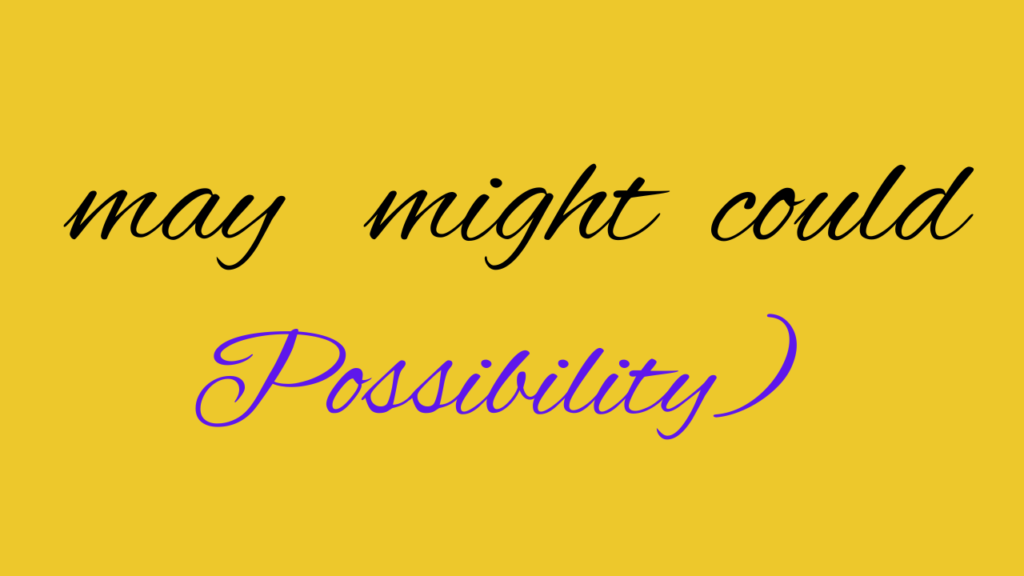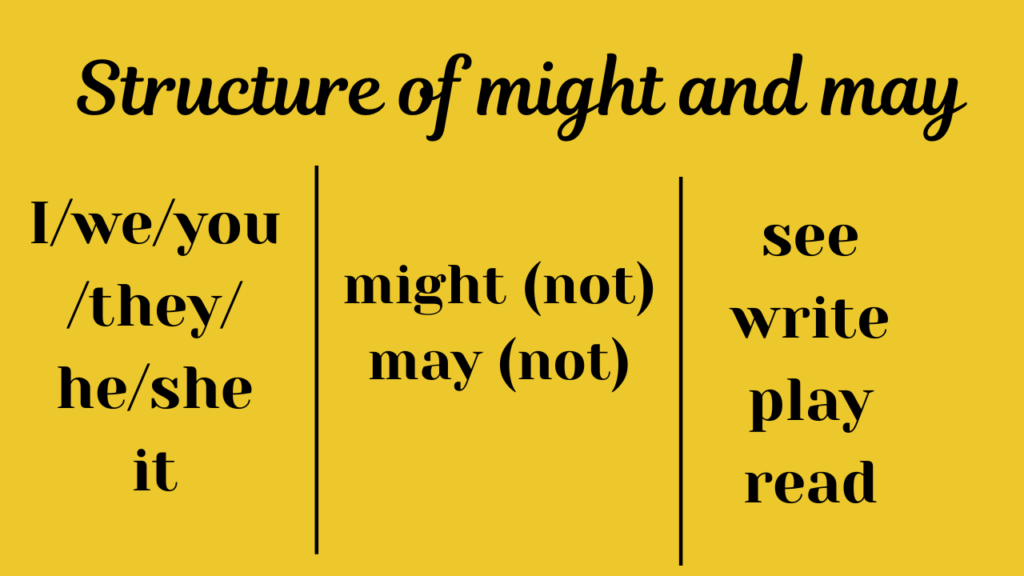May, might, could exercise with answers help you to understand the power of possibility. This blog will cover the use of may, might, and could. We have explained the structure of may and might, which students can use in everyday life. You will get exercise on may, might, and could with answers.
How to Use May and Might?
- We use may and might to indicate that something is a possibility.
- She may be late. Or She might be late.
- He might reply. Or He may reply.
- We use may and might to talk about possible actions in the future.
- Take a raincoat with you when you go out. It might rain.
- It doesn’t matter whether you use may or might.
- I may go to Goa. Or I might go to Goa.
We use might when the situation is not real.
If I knew our neighbours better, I might invite them to lunch.
- There is a continuous form: may or might be-ing.
- Don’t play the guitar at 9.30. I might be studying.
- The negative forms are may not or might not.
- I might not go to school tomorrow.
- For the past we use may have (done) or might have (done).
- I can’t find my notebook. I might have left it in school.

Exercise (Write Sentences with Might)
- (It is possible that I’ll read a book).
- (It is possible that Sita will forget to do her homework).
- (It is possible that it will rain today).
- (It is possible that Mohan will be busy tonight).
- (It is possible that I will go fishing).
Write sentences with might not.
- (It is possible that Sue will not phone you).
- (It is possible that I won’t buy a new car).
- (It is possible that John won’t meet his friend tomorrow).
- (It is possible that They will not play tennis tomorrow).
- (It is possible that he will not be in his office).
Answers:-
- I might read a book.
- Sita might forget to do her homework.
- It might rain today.
- Mohan might be busy tonight.
- I might go fishing.
- Sue might not phone you.
- I might not buy a new car.
- John might not meet his friend tomorrow.
- They might not play tennis tomorrow.
- He might not be in his office.
Study the Structure of Might and May

Write five things that you might do tomorrow.
- I might go to school.
- I might meet my grandmother.
- I might do my homework.
- I might listen to music.
- I might play cricket.
Use of May
- May is used as a principal verb to denote permission: –
May I sit here? Yes, you may. No, you may not.
May I borrow your umbrella? Yes, you may. No, you may not.
May I go to the market? Yes, you may. No, you may not.
- May is used in interrogative sentences: What may be the result of this exam?
What may we expect from you?
Might is used more in negative sentences:-
He might not give her a present.
She might not celebrate her birthday.
- May is used to denote wish; as,
May God bless you!
May you have a long life!
- May is used to refer a purpose; as,
My brother studies hard so that he may pass the exam.
The soldiers died so that we might live.
Exercise (Use May or Might)
Fill in the blanks with may or might: –
- It _____ rain later.
- She was not at home, I thought she _____ be with her brother.
- We _____ be lucky to see a tiger today.
- They _____ not go tomorrow unless you wanted.
- Diane _____ not come to the party.
- _____ I ask a question.
- I am not sure. I _____ go to Delhi.
- He ______ go out this evening.
- I ______ go to the cinema this evening?
- _____ I sit here?
- Bill _____ be at home tomorrow morning.
- We _____ not borrow his bicycle.
- Merry _____ play chess tonight.
- ______ I go to the washroom.
- Barabara ______ phone later.
Answers:-
- might
- might
- might
- might
- might
- may
- might
- might
- might
- may
- might
- might
- may
- may
- might
Could or Couldn’t
Sometimes could has a similar meaning to may and might:
- The doorbell is ringing. It could be Ram.
- You could have left your bag at home.
- Somebody has left a parcel. It could be a postman.
But couldn’t (negative) is different from may not and might not.
- She was too late so she couldn’t have attended the meeting. (= it is not possible that she attended the meeting).
- A: I wonder why she didn’t cook today.
- B: She might not have been well. (= Perhaps she was not well or perhaps she was well).
Also Read:-
- 50 Sentences of Past Perfect Tense with Examples and Rules
- Use of Present Perfect Tense in 50 Sentences: Example, Formula and Structure.
- 5 Surprising Ways to Develop Civic Sense in 2025

Written by Sukhjit Kaur, English educator with 17+ years of experience helping students master grammar and writing. Through EnglishVedas.com, she simplifies English grammar using examples from daily life and classrooms.

